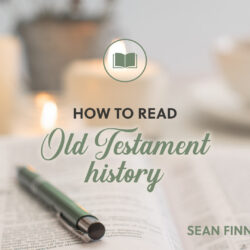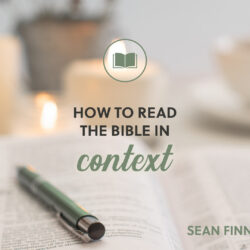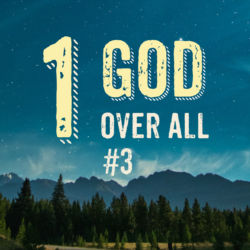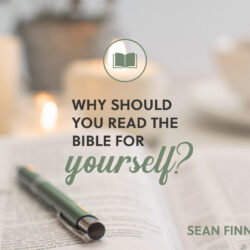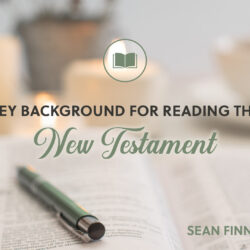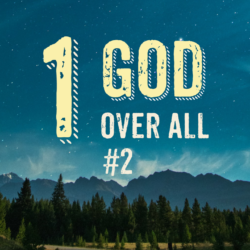This is part 9 of the Read the Bible For Yourself.
The 17 books of the prophets comprise 27% of the Old Testament. Although some parts can be difficult to comprehend, they reveal the heart of God with raw pathos and brutal honesty. To read the prophets, then, is to draw near to God. No other section of scripture so beautifully and tragically reveals God’s feelings. In this episode you’ll learn about the major time periods, how to read the prophets within their context, and some of the major themes. As always, this brief survey should help you read and understand the bible for yourself.
Listen to this episode on Spotify or Apple Podcasts
—— Links ——
- See other episodes in Read the Bible For Yourself
- Other classes are available here, including How We Got the Bible, which explores the manuscript transmission and translation of the Bible
- Get the transcript of this episode
- Support Restitutio by donating here
- Join our Restitutio Facebook Group and follow Sean Finnegan on Twitter @RestitutioSF
- Leave a voice message via SpeakPipe with questions or comments and we may play them out on the air
- Intro music: Good Vibes by MBB Attribution-ShareAlike 3.0 Unported (CC BY-SA 3.0) Free Download / Stream: Music promoted by Audio Library.
- Who is Sean Finnegan? Read his bio here
—— Notes ——
Canonical Arrangement
- 5 Major Prophets
- Isaiah
- Jeremiah
- Lamentations
- Ezekiel
- Daniel
- 12 Minor Prophets
- Hosea
- Joel
- Amos
- Obadiah
- Jonah
- Micah
- Nahum
- Habakkuk
- Zephaniah
- Haggai
- Zechariah
- Malachi
Chronological Arrangement
- early pre-exilic: Amos, Hosea, Jonah, Micah, Isaiah
- late pre-exilic: Nahum, Zephaniah, Obadiah, Joel, Habakkuk, Jeremiah
- exilic: Ezekiel, Daniel
- post-exilic: Haggai, Zechariah, Malachi
Setting
- The historical context is helpful
- In Jer 1.1-3, Jeremiah prophecies during the last days of the kingdom. He’s the last chance for the people to repent. Since they go into exile anyhow, it’s easy to anticipate that the people will not respond to Jeremiah.
The Prophet
- God calls prophets into his service (Jer 1.4-6)
- oftentimes, the prophet has access to the king and speaks to him
- competition with false prophets (Jer 28.1-3, 15-17)
Acting out prophecies
- Ezekiel
- built a model of Jerusalem and acted out a siege against it (Ezek 4.1-3)
- lay on his side for 390 days (Ezek 4.4-5)
- cooked his food over animal excrement (Ezek 4.12, 14-15)
- Jeremiah
- shattered a piece of pottery (Jer 19.10-11)
- wore an oxen yoke around (Jer 27.2)
- bought a property while city is under siege (Jer 32.24-25)
- Isaiah
- walked barefoot and naked for 3 years (Is 20.2-4)
- Hosea
- married an unfaithful prostitute to illustrate God’s relationship w/ Israel who kept cheating on him with idols (Hos 1.2)
Preaching to the People
- fidelity to the Torah, the covenant
- justice in business dealings and courts
- take care of the vulnerable quartet (Jer 22.11-16)
- practice moral and ritual aspects of religion (Jer 7.4-10)
- avoid fake righteousness and hypocrisy (Jer 9.8)
- do not worship idols (Jer 7.16-18)
Prophesies of the Future
- near judgment or restoration
- judgment upon nations (Edom, Egypt, Syria, etc.)
- use Assyrians/Babylonians to judge Israel/Judah
- return to the land and enjoy covenant blessings
- be faithful or lose the land again
- eschatological judgment and restoration
- a Davidic king will rule wisely and execute justice
- healing for the lame, deaf, blind, etc.
- healing for the land, especially the deserts
- abundance and prosperity
- peace among the nations
- no need for militaries or even training for war
- peace among the animals
- elimination of death itself
Prophets Reveal God’s Heart
- God is a lover
- prophets express God’s emotions
- lots of colorful language
- God provides hope for the remnant
Review
- The prophets make up a huge portion of the Old Testament (17 books)
- Some prophets served before the exile, others during the exile, and others after the exile.
- Pay attention to the historical context, including who was king and what was happening with Israel or Judah.
- Prophets are commissioned by God to speak his words to his people and his king.
- The prophets sometimes had encounters with false prophets who challenged their message and authority.
- A prophet’s predictions served to authenticate or disprove their legitimacy.
- The prophets fought injustice, especially the exploitation of the quartet of the vulnerable: the widow, the orphan, the sojourner, and the poor.
- The prophets railed against idolatry and hypocrisy.
- Yet they also prophesied about the coming kingdom judgement and restoration, offering hope for the remnant.
- Because the prophets were close to God, they reveal his heart in a way no other part of the Bible does.

